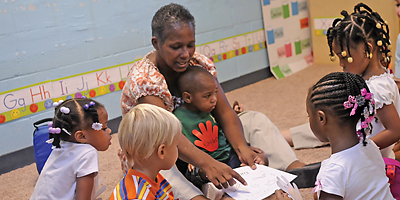
 Choosing the right school is one of the most important decisions a parent will make, and it isn’t always easy.
Choosing the right school is one of the most important decisions a parent will make, and it isn’t always easy.
Catholic school, secular private school, public school or homeschool are all options. Grade school classrooms are even available through the Internet.
Sister Pamela Smith, director of Catechesis and Christian Initiation for Parishes and Schools, said no matter which option families choose, Catholics have certain guidelines to follow in terms of religious education.
She said the church has always believed that parents are the primary educators of their children. They oversee academics and provide the day-to-day example of how to live a faith-filled life.
But the Sister of Sts. Cyril and Methodius stressed that parents can’t do it alone, and said families must be integrated into parish life and its educational programs, especially in regard to the sacraments.
At Catholic schools students have daily prayers, celebrate Mass and attend religion classes, including sacramental preparation programs such as first Communion.
Parents whose children are in non-Catholic schools or are homeschooled have the added responsibility of providing religious education.
Lanie Ayers said all three of her children attended public school, with the youngest still at Seneca High School.
They are members of St. Paul the Apostle Church in Seneca and St. Andrew Church in Clemson, where her oldest daughter is still dedicated to youth group.
Ayers said she and her husband Bobby didn’t do anything special to teach their children — religion was just a part of family life. They offered blessings before meals and said their prayers. They attended and taught Sunday school, went to religious education classes and were active in the youth group.
“They really enjoyed that, and still do,” she said. “They never went kicking or screaming.”
Another program that has had a big impact on her children is the diocesan Christian Leadership Institute. She said they were truly moved by that experience.
Ayers said two of her children are already grown — Chad, 29, and Callie, 25 — and she can see a big increase in the pressures from peers and society that Camlin, 16, faces.
“Without the youth ministry program that they have, our youth wouldn’t get what they need. It’s so important,” she said. “You just have to keep them focused — attending Mass and talking about the faith.”
Other parents agree, saying parish involvement is key to living the faith.
Barbara Griswald and her husband Scott are active members of St. Francis by the Sea Church on Hilton Head Island and she has homeschooled all of their children. She said parents who homeschool can find a number of comprehensive religious programs, such as the Seton curriculum.
Sister Pam said Seton is a good option, but cautioned parents to discuss all religious programs and materials with their pastor, and involve the church’s director of religious education in their planning.
“We totally respect the right of parents, and the obligation, to teach their children, but they need to have guidelines,” Sister Pam said.
Griswald said a dangerous trap parents can fall into is to let just the school or just the church teach their children, and said it is the parents’ job from the start to include Catholic teachings in their daily lives. Catholicism isn’t something that stops at the end of the school day, or after Mass, it is a continual part of life, she said.
“No matter where their kids go to school … the most important thing in our experience is going to Mass, obviously on Sunday and as often during the week as you can, and taking advantage of the other sacraments, especially monthly confession,” Griswald said. “Catholic education is a process that never ends — for the children or for the parents.”
